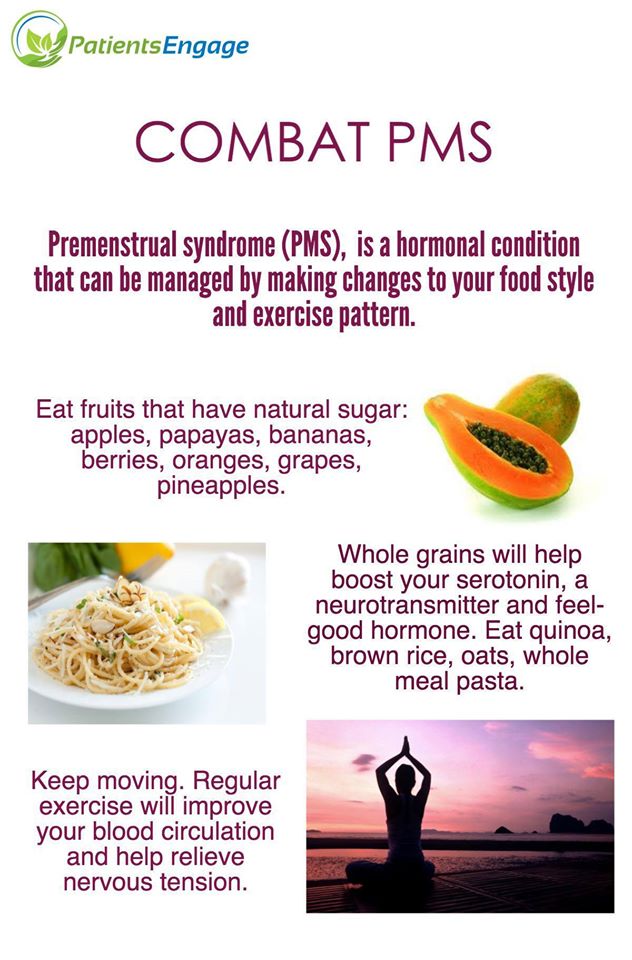
Chase away the monthly blues with food and lifestyle changes. By Nutritionist Kohila Govindaraju. Infographic below.
PMS (pre-menstrual syndrome) is caused by hormonal fluctuations. It affects 85 per cent of menstruating women in varying degrees – from mild (just a bother) to severe (you have to take time off work or your relationships are affected).
PMS is associated with a host of symptoms. Among them are bloating, headaches, irritability, anxiety, depression, tiredness, disturbed sleep, constipation, diarrhea, acne, painful breasts.... Even one of these could ruin an otherwise good day.
Your diet can help alleviate the discomfort of PMS by balancing hormone levels and the chemicals in the brain.
Here, some top PMS-busting tips:
Symptom: Unhealthy cravings, mood swings
Beat it by eating: Fruits & vegetables
Why: Vitamin A from broccoli, carrot, papaya help regulate the effect of fluctuating hormones. Also, fibre, both soluble and insoluble, in fruits and vegetables helps prevent frequent cravings, which may tempt you to snack on crisps or cookies. Stock your kitchen with filling but low-starch vegetables like cucumber, broccoli, cauliflower, french beans, spinach, carrots, celery, okra, bell peppers and cabbage. Fruits offer the same beneficial nutrients and antioxidants as vegetables with natural sugar. Snack on a variety of fruits like apple, papaya, banana, berries, orange, grapes, pineapple. It’s better to limit your fruit juice intake as it is mostly sugar and water without the fibre of whole fruit.
Idea: Cucumber boat: Mix chopped mango 2 tbsp, tomato 2 tbsp, onion 2 tbsp, cilantro 2 tbsp, lemon juice 1 tbsp, ground black pepper 1/2 tsp. Slice cucumber in half, scoop out the seeds and stuff it with the chopped mixture. A healthy ‘rainbow’ dish!
Symptom: Depression, cravings, constipation
Beat it by eating: Whole grains
Why: Whole grains are rich in mood-boosting complex carbohydrates. Whole grains boost serotonin, a feel-good hormone. They also provide a slow and steady supply of energy, so you don’t crave food as often. So, stock your kitchen with whole meal bread, quinoa, brown rice, oats, whole meal pasta, barley, buckwheat etc - rich in fibre and complex carbohydrates. Other options include grains like ragi, bajra, jowar and millet.
Idea: Kickstart your day with whole grain toast, a scrambled egg and orange juice.
Symptom: Water retention, irritability, depression
Beat it by eating: Beans (If eating beans makes you feel gassy, soak the beans and then discard the water before cooking)
Why: Beans are a good source of magnesium, which helps prevent water retention and regulates the activity of serotonin, the feel-good neurotransmitter. Chickpeas are a good source of Pyridoxine (Vitamin B6), which aids in the production of dopamine, a neurotransmitter that helps reduce irritability. Stock the kitchen with kidney beans, chickpeas, lentils, split beans to get all the essential aminoacids required for protein formation in the body.
Idea: Make a salad with kidney beans, chickpeas and cherry tomatoes. You can also add beans to pasta or have as soup.
Symptom: Stress, crankiness
Beat it by eating: Omega 3-rich foods, like tuna, mackeral, salmon, trout, herring, flax seeds, pumpkin seeds and walnuts
Why: Omega 3-rich foods help to keep stress hormones - cortisol and adrenaline - in balance to control crankiness.
Idea: Salmon and avocado in lettuce wrap: Mix grilled or panfried salmon fillet with chopped onion, cucumber, fresh dill /cilantro, yoghurt, lemon juice, chopped avocado, salt and pepper. Place the mix in lettuce leaves, roll up and eat.
Symptom: Sleep disturbance, cramps, bloating, craving, irritability
Beat it by eating: Milk, eggs, nuts, banana, calcium-rich veggies like broccoli, green leafy vegetables
Why: Calcium relieves depressive symptoms and anxiety together with Vitamin D, which influences emotional changes. Milk is a good source of Tryptophan, which promotes melatonin, a sleep-aid hormone. Banana is a good source of melatonin, too.
Idea: A glass of milk before bedtime
Do not stop exercising. Keep moving.
Regular exercise of at least 30 minutes helps relieve some of the symptoms of PMS. Physical activities improve blood circulation and help relieve nervous tension and anxiety.
Every day, do the following: 10 minutes of aerobic exercise, followed by 10 minutes of strength training and 10 minutes of stretching.







